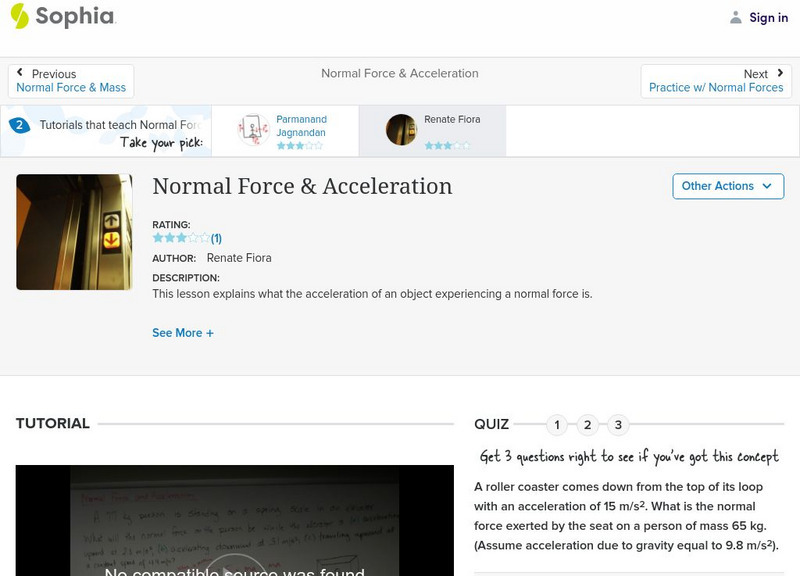Virtually Passed
Disk rolling down incline problem
Find the acceleration of the center of mass of the disk. 1. Use F = ma AND M = I alpha 2. Assume pure roll ie a = r alpha 3. Check validity of assumption ie, F less than Fmax 4. If F less than Fmax, THEN assumption is true 5. If F...
Upayan Mathkari
Rolling Without Slipping Friction
How to find the minimum coefficient for an object to roll without slipping on an incline.
Virtually Passed
Tension and Pulleys in static equilibrium Example 1
Here we solve for the constant tension in the rope of a pulley system in static equilibrium. Remember the assumption that the tension is uniform everywhere is valid if: 1) The system is in static equilibrium 2) The rope is massless 3)...
Virtually Passed
Kinetic Friction and Static Friction intuition
Hey guys, this video covers the intuition behind friction. Friction always acts in the direction opposite to the applied force. Using this and the fact that the static coefficient of friction is different to the kinetic coefficient of...
Mazz Media
Push
This live-action video program is about the word push. The program is designed to reinforce and support a student's comprehension and retention of the word push through use of video footage, photographs, diagrams and colorful, animated...
Mazz Media
Unbalanced Force
This live-action video program is about the term unbalanced Force. The program is designed to reinforce and support a student's comprehension and retention of the term unbalanced Force through use of video footage, photographs, diagrams...
Curated Video
Introduction to Friction: Static and Kinetic Friction
This video explains the concept of friction, which is a force that exists between two objects that resists motion. The video discusses the two types of friction, static and kinetic, and explains how they work. It also explains how the...
Schooling Online
Physics Introduction to Statics and Dynamics: Forces and Newton's Laws - Newton's 2nd Law of Motion
All is quiet inside the anthropology and archaeology museum… until Carmen strikes again! This lesson will apply Newton’s 2nd Law of Motion to moving and accelerating objects. Definitions included: Newton’s 2nd Law of Motion, proportional...
Schooling Online
Physics Introduction to Statics and Dynamics: Forces and Newton's Laws - Newton's 1st Law of Motion
Vector Man rescues someone who is having a heart attack! But he doesn’t take them to the hospital… This lesson will apply Newton’s 1st Law of Motion to stationary, moving and accelerating objects.
Definitions included: net external...
Professor Dave Explains
Newton's Third Law of Motion: Action and Reaction
Are you tired of Newton's laws of motion yet? Well, lucky you, this is the last one. And it's the most misunderstood as well! People love making inappropriate metaphors with scientific principles, unfortunately. Watch this to make sure...
Mazz Media
Force
This live-action video program defines force as an influence or action that is capable of changing the velocity of an object. The program introduces and describes acceleration, velocity and friction. Students will come to understand...
Professor Dave Explains
Frictional Forces: Static and Kinetic
Newton's first law tells us that an object in motion will remain in motion, but we don't really see that on earth, do we? If you throw a ball, or push a hockey puck, these things do eventually stop. Why? To answer this we must learn...
Flipping Physics
Introduction to Newton’s First Law of Motion
Learn about Newton’s First Law of Motion with two examples shown. Plus, I snuck in some free body diagrams and subtle hints at Newton’s Second and Third Laws as well. Thank you so much to Mrs. Zeller for being a Flipping Physics...
Veritasium
What Is a Force?
What forces are acting on you right now? The video, produced by Veritasium, asks viewers to answer this question. It also quizzes them on what a force is defined as outside of Star Wars. Clicking through to a second video provides the...
Veritasium
What Forces Are Acting On You?
You may not realize it, but you get pushed around every day. What forces are acting upon you? Young physicists explore gravitational force and normal force in a video that demonstrates both forces and their directions as they move...
Bozeman Science
Free Body Diagrams
How can you keep track of all the forces acting on an object? Pupils learn how to use a free body diagram to represent the forces acting on an object. After explaining the different forces, the instructor leads viewers through a series...
Bozeman Science
Bozeman Science: Contact Forces
In the following video Paul Andersen explains how contact forces result from interatomic forces. [5:29]
Khan Academy
Khan Academy: Normal Force: Normal Force and Contact Force
A discussion of the force that keeps a block of ice from falling towards the center of the Earth. The example problem has two 5-kg blocks of ice on the surface of a frozen lake, one stationary and one moving at a constant velocity. [7:18]
Khan Academy
Khan Academy: Normal Force: Normal Force in an Elevator
How the normal force changes when an elevator accelerates
Khan Academy
Khan Academy: Inclined Planes and Friction: Static and Kinetic Friction Example
In this video lecture, the topics of static and kinetic friction are explored with examples. The video discusses free-body diagrams and the forces that affect the movement of objects. [9:49]
Sophia Learning
Sophia: Normal Force: Lesson 2
This lesson introduces the concept of normal forces. It is 2 of 2 in the series titled "Normal Force."
Sophia Learning
Sophia: Normal Force & Acceleration: Lesson 2
This lesson explains what the acceleration of an object experiencing a normal force is. It is 2 of 2 in the series titled "Normal Force & Acceleration."
Sophia Learning
Sophia: Normal Force & Mass: Lesson 2
This lesson demonstrates how normal forces can be used to find the mass of an object. It is 2 of 2 in the series titled "Normal Force & Mass."










